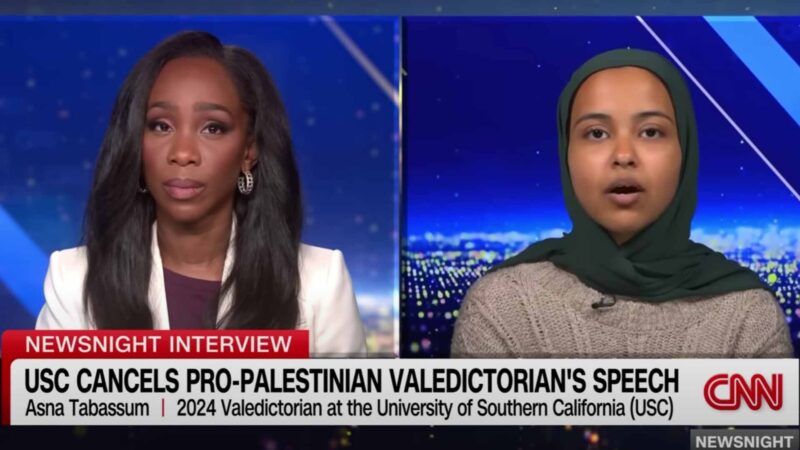USC Cancels Valedictorian's Speech Over Bogus 'Safety Concerns'
The university has a history of suppressing speech from both sides of the Israel-Palestine conflict.

This week, the University of Southern California (USC) announced that the college's valedictorian, Asna Tabassum, would be barred from speaking at commencement. The school cited concerns that Tabassum, who had recently come under fire for an anti-Israel social media post, would create safety concerns.
USC announced that Tabassum had been selected as the school's valedictorian on April 4, after choosing her from among over 100 students with a GPA of 3.9 or higher.
But less than two weeks later, the school announced that Tabassum would not be allowed to speak at commencement, following complaints from several USC student groups over Tabassum's social media postings. Namely, many cited a link in Tabassum's Instagram bio that calls Zionism a "racist settler-colonial ideology that advocates for a jewish ethnostate built on palestinian land" and calls for "the complete abolishment of the state of israel."
"Unfortunately, over the past several days, discussion relating to the selection of our valedictorian has taken on an alarming tenor," Provost and Senior Vice President for Academic Affairs Andrew Guzman wrote in a letter to USC students and faculty. "The intensity of feelings, fueled by both social media and the ongoing conflict in the Middle East, has grown to include many voices outside of USC and has escalated to the point of creating substantial risks relating to security and disruption at commencement."
Rather than directly citing the political content of Tabassum's speech, USC officials made nebulous claims that her speech might imperil student safety.
"While this is disappointing, tradition must give way to safety," wrote Guzman. "This decision is not only necessary to maintain the safety of our campus and students, but is consistent with the fundamental legal obligation—including the expectations of federal regulators—that universities act to protect students and keep our campus community safe."
Ironically, Guzman argued that the decision had nothing to do with free expression concerns. "To be clear: this decision has nothing to do with freedom of speech," he wrote. "There is no free-speech entitlement to speak at a commencement. The issue here is how best to maintain campus security and safety, period."
However, Guzman is hardly convincing.
"Implicit in the idea of a campus committed to robust expressive rights is that administrators won't censor their students just because they have controversial views," wrote Alex Morey, an attorney for the Foundation for Individual Rights and Expression (FIRE). "Here, USC should have been palms up about any genuine security threats, with administrators first doing everything in their power to provide adequate security for the event so it could proceed. Canceling it should be a last resort."
While it's easy to view this censorship as reflective of USC taking a side in the Israel-Hamas war, the reality is much more mundane. USC, like many colleges, is primarily concerned with avoiding controversy at all costs—not with taking a side in a complex political debate. For example, just last year, the school banned a Jewish professor from campus after he was filmed calling Hamas "murderers" and calling protesting students "ignorant"—though the sanctions against him were eventually reversed under pressure.
The cancellation of Tabassum's speech presents a clear example of just how risk-averse university administrations tend to be. When controversy arises—either from the left or right—the prevailing response is censorship, rather than a principled stand for free expression.


Show Comments (87)